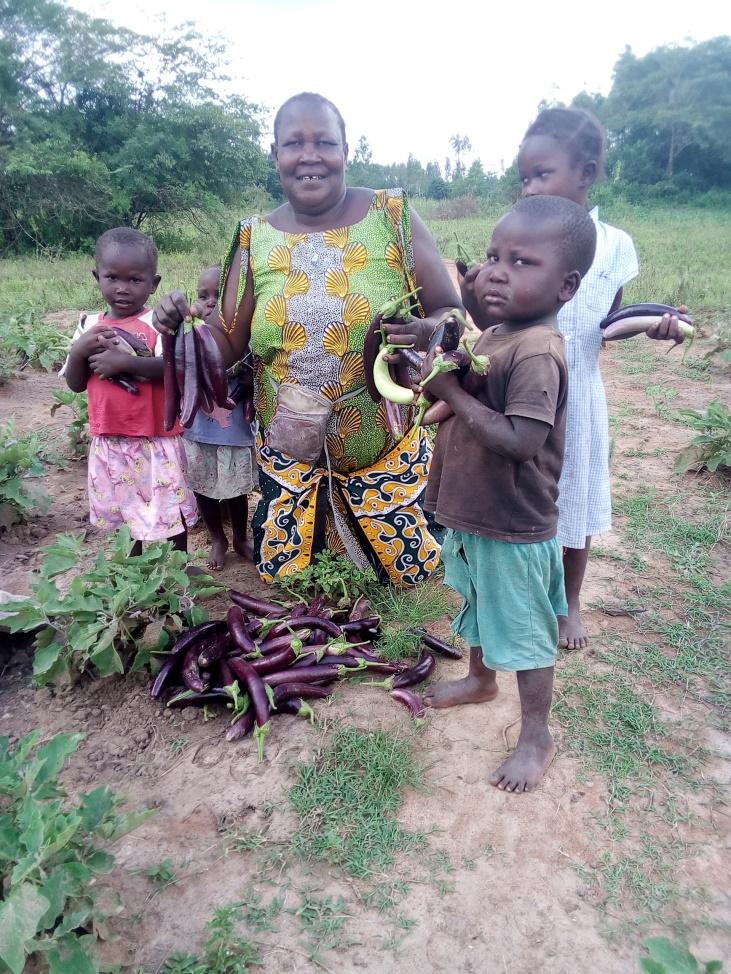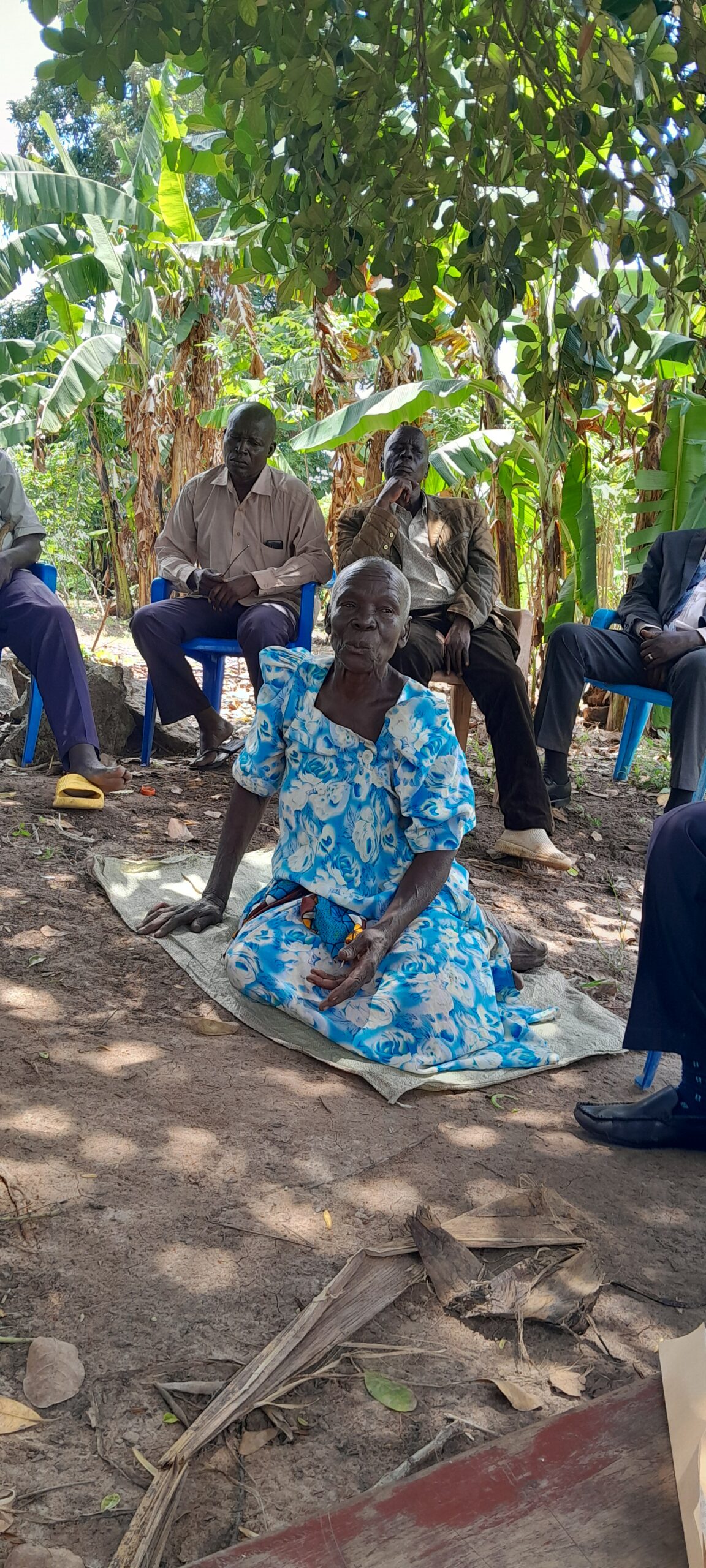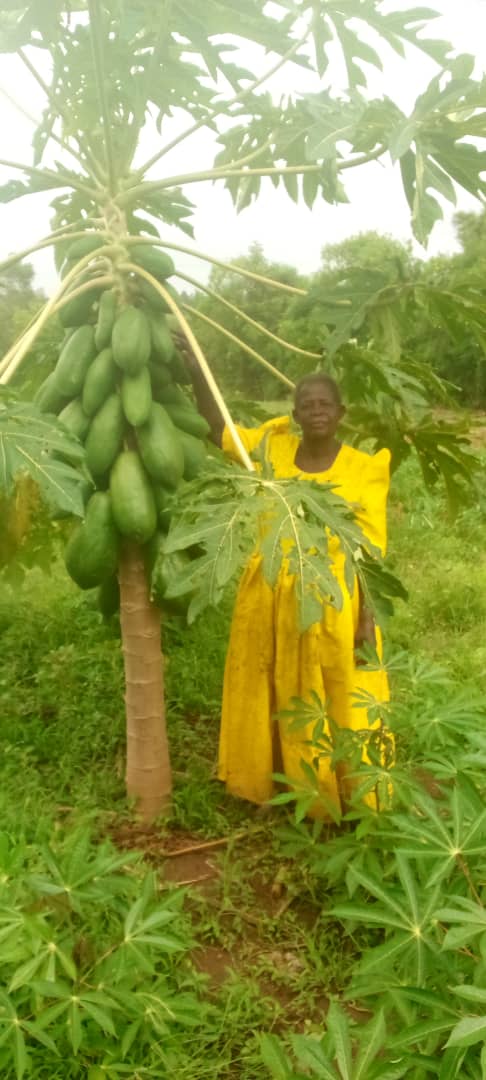LERWA-Land and Environmental Rights Watch Africa Ltd implemented a contextualized and robust capacity building support initiative aimed at building resilient and self-sustaining communities able to identify alternative sustainable solutions to mitigate abuse of environmental rights within Tororo district from February 2021 to January 2022. To be able to achieve the overall project objective of enhancing the capacity of communities in land and environmental preservation, protection and promotion through participatory approaches, the Forest Garden Approach was adopted for implementation. LERWA-Land and Environmental Rights Watch Africa believes that agroforestry especially using the Forest Garden Approach is an appropriate intervention strategy to prevent and mitigate the cited challenges in the proposal. Forest Gardens bring real benefits for people living in poverty whilst at the same time helping to mitigate and adapt to climate change, as well as increasing biodiversity and supporting ecosystems. They are particularly important for smallholder farmers (who are the majority) because they generate diverse products and services on a limited land area. Farmers access products such as food, fodder, lumber, building materials and wood fuel from their Forest gardens. Rural poverty will also be reduced as on-farm production and household income increase through the sales of products. Furthermore, the risk of economic failure is reduced because of the increased diversity of production within the forest gardens. LERWA-Land and Environmental Rights Watch Africa also aims to help improve the health and nutrition of the rural poor. The on-farm production of fuel, fodder and other tree products otherwise collected from off-farm sources reduces the time and effort needed to obtain them (often lessening the burden on women) or save money if the products would otherwise be purchased. All these are compounded by the range of environmental benefits of the system. For example, improved soil fertility (through the planting of fast growing nitrogen fixing trees and application of organic fertilisers), protect crops and livestock from wind, restore degraded lands, improve water conservation, limit pests and prevent soil erosion.
Using the funding provided by AJWS, rural vulnerable farmers (mostly women and youths) were identified, trained and supported to establish forest gardens across Tororo district. The six trainers working with the farmers to establish forest gardens attended a five (5) days’ Training of Trainers workshop at TREES for the Future Training site in Lukhonge, Mbale from 8th to 12th March 2021. The objectives of the ToT included providing the team with relevant and practical knowledge, skills and tools in forestry, fruit and vegetable growing, orienting the team in the project activities so as to prepare them adequately for the project implementation and establishing a team of trainers to facilitate trainings and future learning experiences. The country director, Programmes Officer and four volunteer community mobiisers attended the training workshop. The community mobilisers were recruited to support the staff as trainers and mobilisers during the project implementation duration. They mobilise, monitor and evaluate whether the beneficiaries are effectively applying the knowledge they receive and also support the beneficiaries during the establishment of the demonstration sites. The training took place in at Lukhonge subcounty, Mbale at the training and demonstration site of TREES for the Future. The Training Coordinator for TREES for the Future Uganda, a not for profit organization focusing on fighting climate change through the Forest Garden Approach organized and facilitated the training. The LERWA team later sat for the Trainer Certification Examinations to become certified trainers and receive internationally recognised certificates on 7th April 2021 at the offices of TREES for the Future in Mbale district.
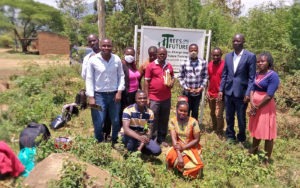
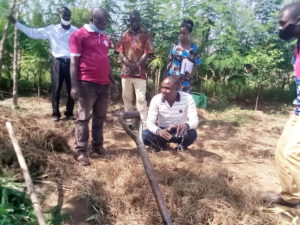
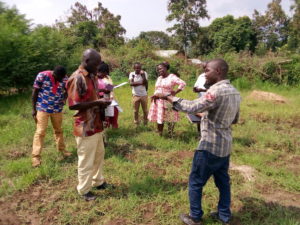
After the ToT, project beneficiaries were mapped and identified in seventeen (17) subcounties of the district. The subcounties included Mella, Osukuru, Mukujju, Rubongi, Nabuyoga, Peta, Iyolwa, Magola, Western Division, Nagongera, Mulanda, Paya, Molo, Kwapa, Merikit, Kirewa and Kisoko. The LERWA team with support of local government extension workers (Subcounty Agricultural Officers, Community Development Officers and Community Based Facilitators) conducted community appraisal visits from the 22nd of March to the 1st of April 2021. This involved visiting individual homestead of potential farmers identified by the sub county local government officers to interview and make physical assessment of the farmers, their households and land where possible. The main objectives of this exercise were to identify the 510 primary stake holders who would benefit from the tree, fruit and vegetables planting initiatives, develop a database of beneficiaries and establish rapport between the organisation and communities. A beneficiary selection criterion to identify the most eligible beneficiaries for the project was developed by the Director and programs officer. Within the targeted communities (identified using agreed criteria), LERWA focused particularly on Vulnerable poor households with previous farming experience and Beneficiaries showing willingness to contribute to the success of the project by playing their role of undertaking crop field management practices – land preparation, planting, weeding, making and applying manures, timely harvesting and sustain project output after its completion – adopting new farming technologies/techniques. A total of eight hundred one (801) potential farmers were mapped during the exercise.

After assessing and analyzing the collected data, five hundred fifty six (556) beneficiaries were selected from the ten subcounties of Mulanda, Rubongi, Iyolwa, Paya, Magola, Merikit, Molo, Kwapa, Nabuyoga and Peta. These were invited for enrollment as beneficiaries during the creation awareness/ Enrollment activity.
From 26th April to 29th April 2021, the selected beneficiaries were mobilized and enrolled as partners in implementing the project at their respective subcounty headquarters. A total of three hundred eighty (380) farmers were enrolled as project beneficiaries during the exercise. During the enrollment exercise, the selected farmers were enrolled as partners in the implementation of the project by LERWA. The exercise aimed at getting farmers to;
- Understand LERWA’s role in development.
- Understand the Forest Garden concept, the phases to develop a Forest Garden, and get farmers to begin thinking about designing their Forest Gardens.
- Have clear expectations regarding the roles and responsibilities of LERWA, the farmer group leaders, and the individual farmers.
Farmers also signed a Memorandum of Understanding with LERWA during the enrollment activity. The farmers were guided to form farmer groups per sub-county and elect their lead farmers who lead the groups and support LERWA in the mobilization of the farmers, securing of training venues and availing necessary local materials needed for different trainings. A total of 17 farmer groups were formed in the ten subcounties. Each farmer group has a lead farmer as the head of the group who was elected by the group members during the enrollment exercise. The lead farmer’s responsibilities include supporting and liaising between LERWA facilitators and participant farmers within each farmer group, attending all community and training events and meetings as requested by LERWA facilitators, hosting and assisting with facilitation of training events, visiting each trainee at least once each quarter to monitor and follow up on project activities and providing regular technical support to the farmers within their farmer group. Seventeen lead farmers were elected for the seventeen farmer groups.
In March 2021, hailstorms and strong winds devastated Magola Sub County particularly the parishes of Papoli, Magola and Poyem. Over seventy lives were lost during the storms in addition to hundreds of households left without shelter, property and food as the storms destroyed their houses and ravaged their crop lands. Cassava fields (which are the staple food crop of the families in the area) were left bare by the hailstorms. Bananas and other field crops also stood no chance against the storms. LERWA (after consultation with our AJWS Programs Officer) reached out to one hundred seventy eight (178) most affected households to offer relief food in the aftermath of the devastation. From 19th April to 21st April, the most affected vulnerable households (majorly women and youths) were identified and registered by two LERWA Community Mobilisers with support of the local leaders within the parishes. The community mobilisers visited the identified households to assess the devastation and needs of the households. Although shelter was a crucial need identified, efforts to fundraise for provision of temporary shelter to the households by the organization were futile. On 24th April 2021, all the registered household leaders convened at the subcounty headequarters and each received ten (10) kilograms of maize flour commonly known as posho and five (5) kilograms of dried beans. They also each received a sacksful of cassava cuttings which they were encouraged to plant to ensure food availability in the long term to replace their devastated cassava fields.
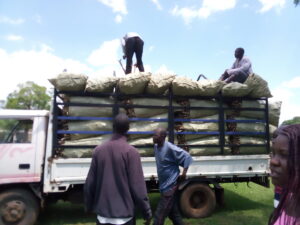
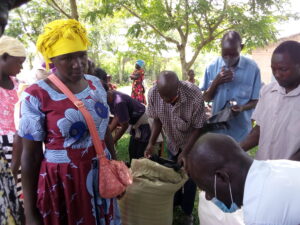
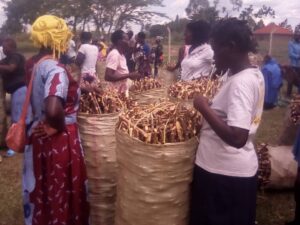
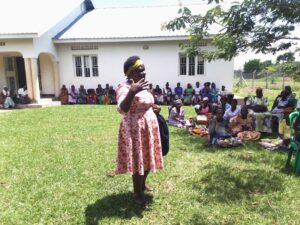
After the identification and enrollment of the project beneficiaries in the ten subcounties of Molo, Kwapa, Rubongi, Mulanda, Nabuyoga, Iyolwa, Paya, Merikit, Magola and Peta, a series of trainings for the beneficiaries in different modules of the Forest Garden Approach were carried out. All the trainings were held at the forest garden sites of the different farmer group lead farmers and involved theoretical and practical sessions. The first training carried out from 3rd May 2021 to 6th May 2021 focused on Forest Garden Design, Household & Market Needs Analysis, and Composting modules. Two hundred ninety two (292) farmers attended the training in all the subcounties.
Farmers begin the Forest Garden project by creating a Forest Garden design for their family’s field that meets the core Forest Garden design principles. These are used as draft blueprints when developing their forest gardens, updating them as needed over the course of the project. During the training of the Forest Garden design module, farmers learned about the structure and layout of forest gardens, primary components and layers and uses of different trees. They also learned to draw a map of a field to scale and forest garden design principles, security, erosion control, pest control, climate smart agriculture, etc. The farmers mapped the lead farmer’s forest garden site and were given a take-home assignment of mapping their individual forest garden sites.
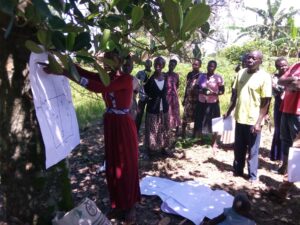
Farmers also had to understand what crops they need to plant in their Forest Garden through an analysis of what they want and need to eat as a household, and what they can sell in the market. The first activities share knowledge around nutrition and how to build a balanced diet for their families. Then they looked at market opportunities through seasonal market analysis, to learn how to exploit production cycles and get the most money for their products as possible. They critically analyzed the nutritional and financial state of their households by identifying gaps in the family diet and unexploited opportunities in the market. They then explored solutions that are rooted in diversification of crop species. Each of the farmers is expected to grow at least six different vegetable types for both home and market consumption. LERWA was to provide seeds of three (3) vegetables to each of the farmers while the farmers had to secure seeds of the other three (3) local/native vegetables. The take-home activity under this module was for the farmers to sit with their families and do the household and market needs analysis to identify which fruit and timber trees and vegetables they would grow in their forest gardens. These lists were compiled and submitted to LERWA by the lead farmers a few days after the training.
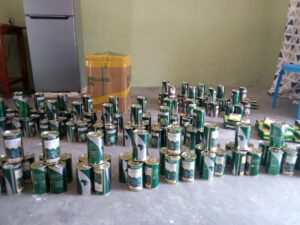
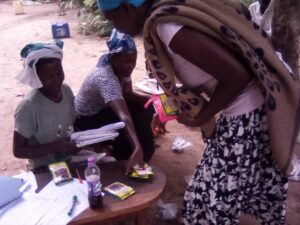
Farmers also explored the science of soil and identified methods that can be used to improve soil fertility as it is a key component of the forest garden. By the end of the training, farmers were able to identify different types of soils and their needs, explain different plant nutrients and how to add them to the soil, produce their own compost on-site in their fields and identify 3-5 plants used to improve soil fertility and explain how they work. A sample compost pile was made using materials that were collected by the lead farmers with support of the LERWA team prior to the training.
From 17th May 2021 to 20th May 2021, a training was organized covering the modules of Seed propagation, Permagardening and Green Wall establishment. A total of two hundred twenty four (224) farmers attended the trainings in the ten subcounties at the respective lead farmer’s homes. The farmers who weren’t able to attend the trainings sent in apologies through their lead farmers citing sickness, burials and other personal challenges as reasons for their absence.
As the first phase of establishing a forest garden is protection, farmers were trained on key elements of a green wall including importance of a green wall and propagating the agroforestry tree seeds. The green wall plays a number of important roles in a forest garden including providing protection against intruding animals and human who would otherwise destroy or steal from the garden. They also provide fodder for domestic animals reared by the farmers, wood fuel for the farmer household and help in stablilising the soils in the forest garden since only nitrogen fixing trees are planted as green walls. LERWA identified Calliandra, Sesbania and Leuceanna as the three tree species that would be planted by the farmers to establish their green walls around their gardens. Each farmer was expected to grow at least 500 trees of each species making a total of 1500 trees planted around their gardens. The tree seeds were provided to the farmers with each farmer receiving 2640 seeds for propagation.
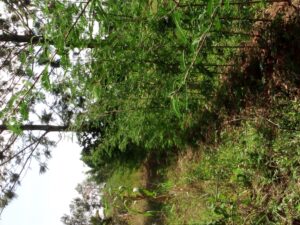
Farmers were trained to use appropriate nursery techniques to propagate vegetable and tree seedlings for planting in their forest gardens. They learned the benefits of nurseries, best practices for preparing and constructing nursery sites including spacing, pretreating commonly used seeds, sowing methods for seed species supplied and best practices for nursery management. The take-home assignment for the farmers was to establish individual vegetable and tree nurseries using the provided seeds.
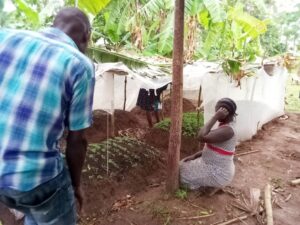
Using provided seeds, farmers were expected to meet their family’s priority subsistence and market needs by nursing, planting and maintaining at least 6 types of nutritious vegetables including 3 not previously planted. These vegetables would be grown on what is known as permagardens which are permanent highly bio-intensive plots of land in their forest gardens. The farmers were motivated to grow new types of nutritious vegetables, understand considerations for nursery and garden site selection, learn best practices for growing a variety of nutritious vegetables including land preparation, spacing, nursing and planting methods, understand how companion planting and triangular spacing can increase yield and reduce pests and moisture loss and also learn basic garden care including soil amending, mulching, watering and natural pest control.
At the end of the training, farmers received the vegetable seeds they had identified and requested for in addition to three agroforestry nitrogen fixing tree seeds of Calliandra, Leuceanna and Sesbania. The vegetable seeds provided to the farmers included tomatoes, onions, carrots, eggplants, Garden eggs (Ntuula/African eggplants), pumpkins, cabbages and collards (sukuma wiki). Each farmer received three (3) vegetable types which they had identified following the training on household and market needs analysis. The take-home assignment for the farmers was to establish their individual vegetable germination nurseries and tree nurseries using the provided seeds. They also had to start preparing and establishing permagarden beds on which they would grow the vegetables. They were encouraged to plant the vegetables that are sowed directly onto the permagardens including the local/native vegetables like the spider plant (akeeyo), aramanthae (dodo), garden peas (boo), etc.
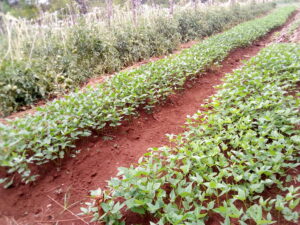
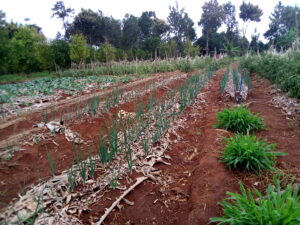
From 14th June 2021 to 17th June 2021, farmer beneficiaries were trained on how to outplant/transplant the vegetable seedlings from their nurseries to their permagarden beds using techniques like triangular spacing, double digging the garden beds for deep water and root penetration, and amending the soils using organic materials like chicken and goat droppings, compost, cowdung manure, forest soils, ash, wood dust, etc while preparing the beds to improve soil fertility. They were also trained on integrated pest management (IPM) using easily accessible organic materials (like red chillies, wood ash, lantana camara leaves, African marigold, etc), companion planting, mulching of the beds, crop rotation, etc. These techniques increase quality and productivity of the permagardens. Two hundred one (201) farmer beneficiaries attended the trainings at their respective lead farmer’s forest garden sites. Since the country was facing a second wave of the COVID-19 pandemic, cloth face masks were distributed to all the farmers who attended the trainings and all the Standard Operating Procedures (SOPs) including hand sanitizing and social distancing were observed to ensure the safety of the farmers and staff. The take-home assignment for all the farmers was to outplant their vegetable seedlings from their nurseries to their permagarden beds applying the skills and knowledge shared.
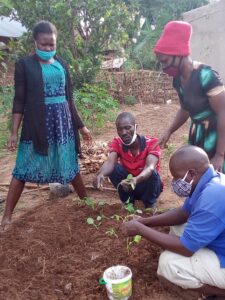
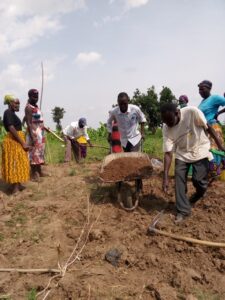
From 26th July to 29th July 2021, another training session on outplanting the agroforestry tree seedlings was organized for the farmer groups at their respective lead farmer’s forest garden sites. Farmers were reminded of the importance of establishing green walls around their forest gardens and also trained on establishing green walls using the tree seedlings. Each side of the green wall is planted with three rows of the agroforestry trees with Sesbania on the outer row (because it is the fastest growing species and can be easily manipulated during weaving to form a thick outer wall), Leuceanna in the middle row (it is studier than the other species and rejuvenates quickly once pruned) and Calliandra in the inner row (once it starts flowering, it has flowers all year round hence quite important for attracting useful insects into the forest gardens). Farmers were also trained on caring for their green walls including constant weeding and pruning so that trees do not grow wild and weaving the trees to form thick and impenetrable hedges around the gardens. Only one hundred ninety (190) farmers attended the trainings; the other farmers weren’t able to attend because the country was under a total lockdown because of the COVID-19 pandemic and movement was highly hindered. However, the farmers who attended the trainings were encouraged to reach out to fellow beneficiaries within their localities and share the skills and knowledge shared. The Lead Farmers were also tasked with following up each farmer to ensure that they applied the skills and knowledge shared. The take home assignment for all the farmers was to outplant their tree seedlings around their forest gardens applying the skills and knowledge shared.
In order to further inspire and motivate the farmers to apply the skills and knowledge on forest gardening, a learning excursion was organized to visit the training site of TREES for the Future at Lukhonge, Mbale where a demonstration forest garden is established. It was noted that the concept of a forest garden seemed so abstract to most of the farmers which derailed them from applying the skills and knowledge shared hence the need to inspire them with a physical evidence of a productive established forest garden. The field excursion was also an opportunity for the farmers to learn from long term practitioners of the forest garden approach at Lukhonge. It gave them an opportunity to share and exchange success stories and challenges with the TREES team hence they were able to draw lessons to apply in their forest gardens. The activity done on 15th September 2021 had forty one (41) farmers in attendance. These were representatives from all the farmer groups. The representatives were tasked with giving feedback to their group members who did not go on the field excursion. The activity involved the farmers convening at the offices of LERWA from where the entire team incuding the community mobilisers/technicians set off to Lukhonge. At Lukhonge, the team was received by the Training Director for TREES for the Future Mr. Richard SsaliKagwa and demonstration site manager, Mr. Isaac Mukosha. A theoretical session during which the forest garden design module, the permagardening module, growing of agroforestry trees for green walls and alleys in the forest garden were reviewed by the TREES team and the farmers. The farmers were later taken on a tour of the demonstration forest garden during which physical components of a forest garden were pointed out and further expounded on. Farmers asked questions in relation to their personal site observations. A question and answer session concluded the tour during which farmers were given opportunity to share challenges they have faced during the establishment of their forest gardens. The tour was concluded with lunch.
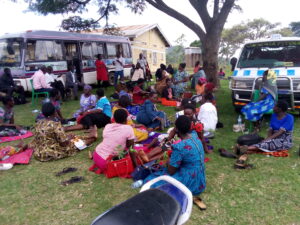
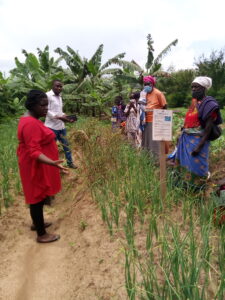
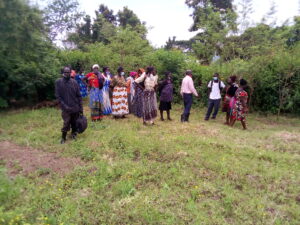
On 26th August 2021, training and networking workshop was organized for the lead farmers at the offices of the organization. The workshop (which was long overdue) was organized with the objective of giving the entire project Lead Farmers an opportunity to network with each other and staff of LERWA, review particular concepts of the forest garden and roles and responsibilities of Lead Farmers. All the seventeen Lead Farmers attended the meeting. The teams (Lead Farmers and LERWA staff) introduced each other and were encouraged to network. The Memorandum of Understanding signed by the Lead Farmers on behalf of their respective groups and LERWA was reviewed with emphasis on the roles and expectations of each signing party. This was done because it was noted by the LERWA that farmers were not holding up to their end of the agreement especially with providing protection for the nursery and permagarden sites. A number of reports had come in from the farmers that their seedlings were destroyed by goats, pigs, chicken, turkeys and ducks. This was contrary to the MOU which clearly stated that the farmers were obligated to protect their nursery sites and gardens. During the workshop, a review of the roles and responsibilities of Lead Farmers was done to further encourage and skill the team. Lead Farmers shared challenges they faced on ground for example having some farmers who weren’t willing to change. A common challenge reported by the lead farmers was unresponsiveness of some of the farmers despite their constant follow-ups. The lead farmers were encouraged to continue to support their group members and report unresponsive farmers to their technicians/community mobilisers. A practical session on making a permagarden bed was conducted after a site visit of the demonstration forest garden at the LERWA premises.
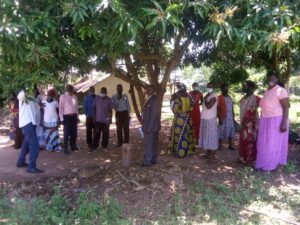
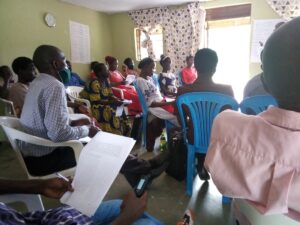
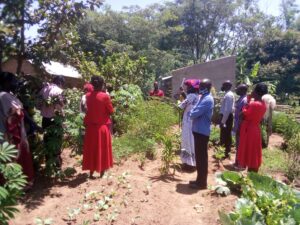
Monitoring or follow-up is a crucial activity in the success of any project. Throughout the granting duration, beneficiary farmers were followed up to monitor their progress and whether they were applying the skills and knowledge shared during training sessions at individual levels. Farmers were also encouraged and offered technical support in case of any challenges encountered during the implementation of the project. Farmers who weren’t able to attend training sessions because of challenges like illness, death of families/relatives, etc were always followed up by their respective lead farmers and technicians to ensure they received the skills and knowledge shared. These follow-ups were majorly through phone calls made to the individual farmers by their respective lead farmers and technicians. Lead Farmers and Community Mobilisers/Technicians were facilitated to physically follow up on their respective group members periodically. The management team carried out two supervisory follow-up activities during which the Country Director visited individual farmers in all the subcounties to monitor and evaluate the progress of the project. These were done in the company of respective Lead Farmers and Mobilisers/Technicians. From 31st May 2021 to 3rd June 2021, Community mobilisers and the Country Director in the company of the respective Lead Farmers visited one hundred and eighty six (186) farmers in the subcounties of Rubongi, Molo, Mulanda, Merikit, Nabuyoga, Peta, Iyolwa, Kwapa, Magola and Paya. This follow up activity was done after the training sessions on forest garden designing, establishing permagardens, compost piles, vegetable and tree seed nurseries and so it’s major objective was to monitor if the farmers had applied the skills and knowledge shared during the trainings. Furthermore, farmers who had not yet received vegetable and tree seeds received them as per their requests. It was noted that some farmers did not receive seeds during the seed disbursement activity because they were not in attendance of the training while others had not yet submitted their seed requisitions at the time of disbursements. These received their seeds during the follow-up activity. Though most of the farmers had made compost piles and established vegetable and tree nurseries which were promising, a general observation made during the follow-up was that most of the farmers were struggling with protecting their nursery sites so most of their seedlings were destroyed by chicken, goats and other domestic birds like turkeys and ducks. It was also noted that most farmers did not follow the instructions shared during the trainings especially on the sizes of the tree nurseries. This affected the germination rate of the tree seedlings. Most farmers focused on establishing vegetable nurseries ignoring the establishment of tree nurseries too. Farmers also reported challenges of finding the right quantities of materials to make their composts and fear of the dry spell which was ongoing in some of the subcounties. Farmers were encouraged to protect their nursery sites using available materials like old used mosquito nets, sticks, used polythenes/sacks, etc. They were also encouraged to collect materials from their neighbourhoods and also support each other as teams on individual gardens. Other farmers were not reached because of the limited time apportioned to the activity.
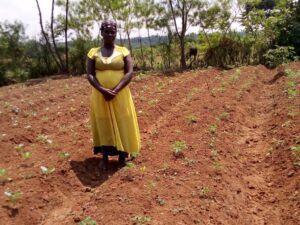
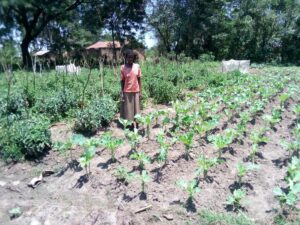
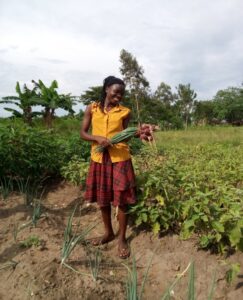
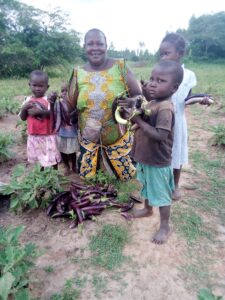
From 13th September 2021 to 15th October, another supervisory follow-up was conducted by the Country Director to all the farmer groups in the company of their respective Community Mobiliser/ Technicians and Lead Farmers. The major objective of this follow-up was to monitor the impact, if any, of the project in respect to the project objective of improving livelihood, family nutrition and food security. Since the farmers had received vegetable seeds at the start of the project, the management team was interested in evaluating the result of the vegetable growing activity so far. Another objective of the follow-up was to support the farmers in their outplanting of tree seedlings activity which was a take-home assignment given to them during the last training session and was ongoing at the time of follow-up. There was also need to receive feedback and possible recommendations from the project beneficiaries on the project. Two hundred forty three (243) farmers were reached in the subcounties of Molo, Peta, Merikit, Kwapa, Mulanda, Nabuyoga, Iyolwa, Paya, Magola and Rubongi during the activity. It was noted that over 78% of the farmers were making effort to apply the knowledge and skills shared during training sessions as they had established vegetable and tree nurseries, had permagardens planted with a variety of vegetables that they were harvesting for both home and market consumption, had at least two active compost piles and were outplanting their tree seedlings to establish green walls around their gardens. A small number of farmers had opted out of the project claiming different reasons like small land sizes, the work is hard and health challenges. Others had wasted their seeds since their seedlings were destroyed by animals and domestic birds while still in the nurseries due to negligence hence they had nothing to show. Most of the farmer’s crops and trees were affected by the long dry spell and pests and diseases which demoralized some of the farmers. However, there were testimonies of the positive results of the project by a majority of the farmers. The family nutrition of the farmers’ households has improved as they now consume variety of vegetables grown in their permagardens. A number of the beneficiaries have testified of no longer struggling to find vegetables to feed their families since they established their permagardens. In addition, livelihoods of some of the farmers have improved as they earn from the sales of surplus vegetables from their permagardens established in their forest gardens. These monies are used to purchase other basic household necessities like soap, access medical care, salt, etc. Others made small income investments using the monies collected from the sales of the surplus vegetables for example, there were nurmerous testimonies of farmers buying goats and chicken from their sales. The sales from these products have greatly boosted their household income. A beneficiary was able to start a fish mongering business using savings from sales of collards from her permagarden in Iyolwa subcounty.
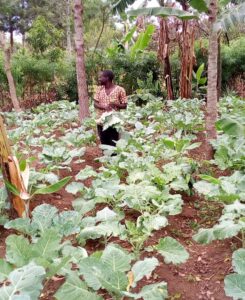
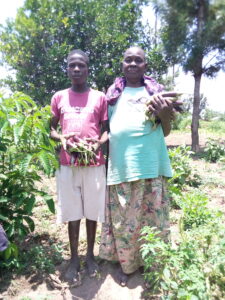
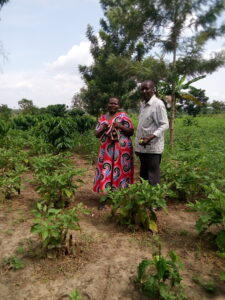
It should be noted that before and after every programmatic activity, the programs team (Community Mobilisers/Technicians, Programs Officer and Country Director) held planning and debriefing meetings. The planning meetings were held to brainstorm and adequately prepare for whatever activity while the debriefing meetings gave the team an opportunity to give brief reports on what happened during the activity implementation focusing on what went right and what did not go right, etc. These meetings fostered accountability and team spirit and gave team members opportunity to share and draw lessons from the different field experiences. They were also great opportunities to brainstorm on way forwards and deal with any challenges encountered or anticipated for the project.
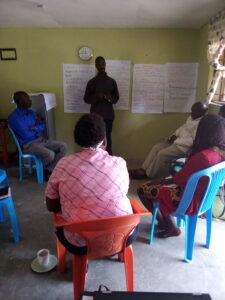
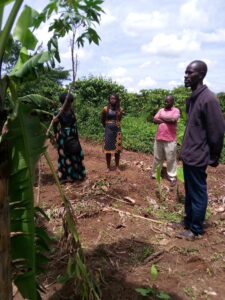
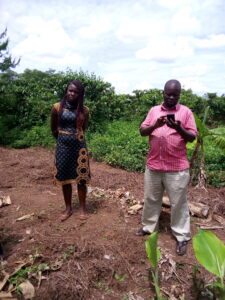
The Training of Trainers (ToT) of Community Mobilisers and staff of LERWA in the Forest Garden Approach at Lukhonge, Mbale by TREES for the Future skilled and equipped the team with basic skills on planning, designing, setting up and managing a forest garden using the Forest Garden Approach which knowledge and skills were transferred to the beneficiary farmers hence farmers were empowered and supported to establish individual forest gardens. The ToT also established rapport between TREES for the Future and LERWA. The team at TREES for the Future provided technical support to the team at LERWA during the implementation of the project; sharing lessons drawn from their long term experience supporting farmers establish forest gardens. These lessons were valuable nuggets that guided the LERWA team in achieving project objectives. The rapport established further resulted into a formal partnership between the two organisations. TREES for the Future have offered a one year Forest Garden Fund of US$10,000 to LERWA to contribute to tree planting and livelihoods development with smallholder farmers for 2022. The grant is intended to rapidly assist large groups of farmers to layer agroforestry into their fields in the form of green walls, alley cropping, fruit trees and other agroforestry technologies. Using the Forest Garden Fund, LERWA will support 300 beneficiary farmers in the subcounties of Molo, Peta, Rubongi, Mulanda, Kwapa, Nabuyoga, Merikit and Paya plant about seven hundred forty three thousand (743,000) agroforestry, fruit and timber trees in their forest gardens by November 2022.
The relief aid provided to the victims of the hailstorm in Magola subcounty offered temporary food aid to the families whose crops were ravaged by the storm. Furthermore, households replaced their lost cassava gardens using the provided cassava cuttings hence securing food for their families in the longterm. This activity further established rapport between the community in Magola subcounty and LERWA hence the community fully embraced the Building Resilient and Self-sustaining communities project. A number of farmers were willing to partner with LERWA during the project implementation.
Through the different training sessions, beneficiary farmers were skilled and supported to establish forest gardens with an aim to revitalize degraded soils, improve their livelihoods through the sales of the products from their forest gardens (vegetables, fruits, timber, fuel wood, etc), improve their family nutrition, and preserve their environments. As a result, over one hundred twenty seven (127) farmers reported that their family nutrition has improved as they now consume variety of vegetables grown in their permagardens. These farmers testified of no longer struggling to find vegetables to feed their families since they established their permagardens. In addition, livelihoods of over ninety eight (98) farmers have improved as they earn income from the sales of surplus vegetables from their permagardens established in their forest gardens. These monies are used to purchase basic household necessities like soap, access medical care, salt, etc. Others made small income investments using the monies collected from the sales of the surplus vegetables for example, thirty six (36) farmers testified of buying goats and chicken for rearing from their sales. A beneficiary, Apio Teddy, from Iyolwa subcounty was able to start a fish mongering business using savings from sales of collards from her permagarden.
Farmers were also given agroforestry tree seeds of Calliandra, Sesbania and Luecenna to propagate and establish green walls. The farmers outplanted their seedlings to establish green walls around their forest gardens. These trees are nitrogen fixing trees which will help stabilize and revitalize farmers’ degraded soils, provide protection to the forest gardens, provide wood fuel to farmer household and fodder to feed farmers’ domestic animals. So far, seventy six thousand twelve (76,012) trees were planted by the beneficiary farmers within the project locations.
It should, however, be noted that it takes approximately two years for farmers to start seeing improved results from their Forest Garden in regards to soil revitalization, sustainable livelihood development and environmental benefits since establishing a full-fledged forest garden is a phased project over a period of at least four years. Therefore, at the moment, we cannot fully measure the impact of the project activities vis-a-vie the project objectives.

